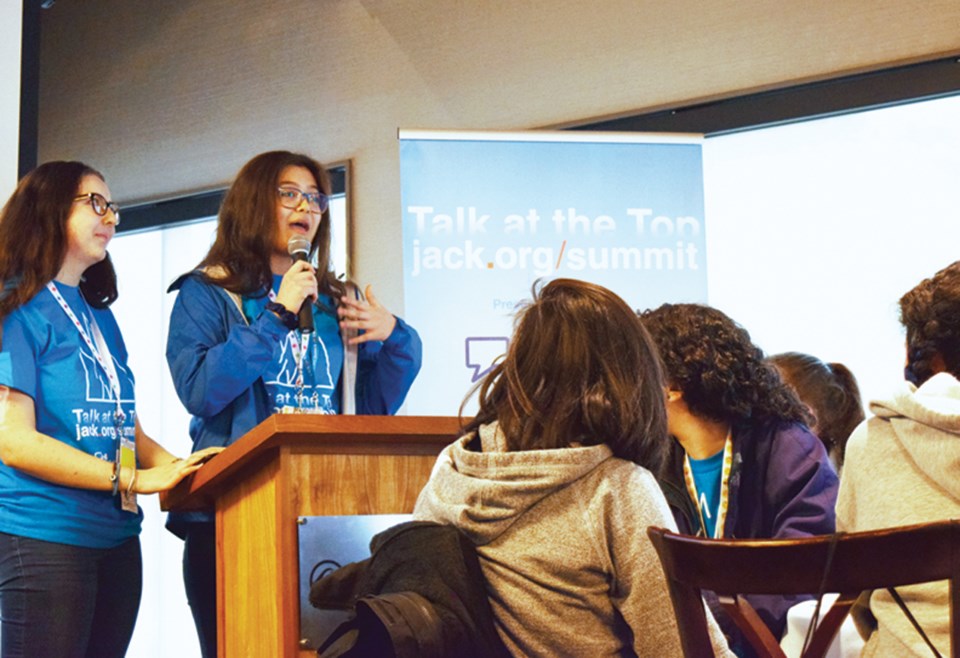Students from North Shore and Sea to Sky secondary schools gathered on Grouse Mountain Saturday for a summit devoted to helping youth become community leaders in mental health awareness.
More than 100 youth volunteered to attend the fifth annual Talk at the Top summit, a student-inspired and led initiative that encourages youth to open up and learn support strategies for what was described at the summit as one of the single most important health issues that exists for young people.
“I came out here pretty hesitantly because I wasn’t sure if I was comfortable in a new environment because I wasn’t even comfortable with my own struggles,” said Talk at the Top veteran and 16-year-old student leader Zohrah Khalili when describing her apprehensions about first attending the summit four years ago when she was in Grade 8. “It was pretty turbulent and rocky and stressful.”
“But then I came here and I was honestly blown away because never before had I been invited into this safe-space where people could talk about their mental health and their mental illness so comfortably and casually,” added Khalili, who is now a Grade 11 student at Carson Graham secondary.
This year’s Talk at the Top was an all-day affair that took place at The Observatory on Grouse Mountain.
Student delegates, representing over 20 schools from across the North Shore and Sea to Sky, were first treated to breakfast before opening remarks and an introductory session called Mental Health 101 familiarized those in attendance on the concepts of stigma, self-care, and mental health awareness in oneself and others.
The morning’s keynote speaker was 15-year-old mental health advocate Maggie Harder from Calgary, Alta.
Harder’s campaign last year to get online retail giant Amazon.ca to remove shirts from its website that mocked suicide and mental illness received national attention.
“When I first saw the T-shirts, my blood ran cold,” Harder said in her keynote speech. “They featured slogans that invalidated mental illness.”
Amazon has since removed the insensitive shirts from its online store.
“I was taking initiative and I was hopeful about it,” Harder said about her campaign. She is now a fierce advocate for mental health awareness and committed to ending the stigma surrounding mental illness.
Following Harder’s speech, student delegates were invited to participate in a number of workshops, including sessions on leadership skills, sharing mental health stories, and developing public speaking skills so they can become engaged advocates for mental health awareness in their schools and communities.
Khalili said that after first attending a Talk at the Top summit four years ago she’s had many opportunities to share her knowledge and skills on the subject.
“I’ve done quite a few educational presentations to teachers in our school district on mental illness, I’ve talked to the staff at my school, the principals, and started a mental health club at my school,” Khalili said.
“Personally, I would be ecstatic if a little Grade 8, like me, could walk away with that inspiration for initiative and being the start for change, being the instigator of their own mental health journey in the community.”
This year, Talk at the Top has partnered with the Ontario-based organization Jack.org in a bid to further help youth become instigators of mental health awareness in their schools and communities in order to save and improve the lives of young people.
Jack.org founder and executive director Eric Windeler said a big reason that Talk at the Top and his organization have joined forces is to help students stay engaged with mental health awareness all year long.
Maintaining a conversation on mental health that goes beyond the boundaries of the day’s summit on Grouse Mountain can be accomplished, he said, by helping students from the North Shore and B.C. start “Jack Chapters,” which are essentially student-run clubs that meet up to make noise and raise awareness about mental health and engage as many people in the school and community as possible.
“What Jack.org is all about is building leadership skills among students who are passionate and want to take a lead in mental health,” Windeler said. “It’s really important that students across B.C., but also across the country, feel connected to something so they know there’s other students doing similar things to what they’re doing.”
According to the Canadian Mental Health Association, 20 per cent of Canadians will experience a mental illness in their lifetime. And while Talk at the Top and Jack.org addresses this, the focus of the summit is primarily on how mental health is a constant for everyone and affects people to varying degrees – and as a young person there should be no shame in discussing mental health issues and trying to create a positive space for conversations on the subject.
In addition to the mental health club she already started herself, Khalili plans to start up her own Jack Chapter club, complete with swag, supplies, resources, and support provided by Jack.org, later this year.
“Creating an environment, starting with myself, to create casual conversations on mental health – it’s pretty amazing to be a person that can do that and have that impact,” Khalili said.



